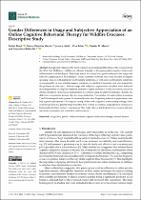Please use this identifier to cite or link to this item:
https://hdl.handle.net/20.500.12202/9455| Title: | Gender differences in usage and subjective appreciation of an online cognitive-behavioral therapy for wildfire evacuees: Descriptive study. Clinical psychology, clinical applications of cyberpsychology and virtual reality for mental disorders |
| Authors: | Binet, Émilie Ouellet, Marie-Christine Lebel, Jessica Morin, Charles M. Belleville, Geneviève Békés, Vera 0000-0003-3043-5155 Bekes |
| Keywords: | usage data gender online treatment cognitive behavioral therapy natural disaster Medicine |
| Issue Date: | 2022 |
| Publisher: | MDPI |
| Citation: | Binet, É., Ouellet, M-C., Lebel, J., Békés, V., Morin, C. M., & Belleville, G. (2022). Gender differences in usage and subjective appreciation of an online cognitive-behavioral therapy for wildfire evacuees: Descriptive study. Clinical psychology, clinical applications of cyberpsychology and virtual reality for mental disorders, Journal of Clinical Medicine, 11(22), 6649. |
| Series/Report no.: | Journal of Clinical Medicine;11(22) |
| Abstract: | Background: Based on the most common psychological difficulties of the evacuees from the 2016 Fort McMurray wildfires in Alberta, Canada, a therapist-guided cognitive behavioral self-treatment was developed. This study aimed to explore how gender influences the usage and subjective appreciation of the RESILIENT online treatment. Methods: Our study included 81 English-speaking evacuees with significant posttraumatic symptoms, or with some posttraumatic symptoms accompanied by at least mild depression symptoms or subclinical insomnia, and who logged into the platform at least once. Various usage and subjective appreciation variables were analyzed, including number of completed sessions, number of logins, number of words per session, perceived efforts, perception of usefulness and intention to continue using the different strategies. Results: No difference was detected in most objective usage indicators. The number of words written in sessions 7 and 10 was significantly greater for women than for men. Regarding subjective appreciation, men had a greater perception of having put strong efforts in the cognitive restructuring strategy, while women reported in a greater proportion that they wanted to continue using physical exercise as a behavioral activation strategy. Conclusions: Our study offers a first look into how women and men use online treatments, and what their preferences are. |
| Description: | Scholarly article / Open access |
| URI: | https://www.mdpi.com/2077-0383/11/22/6649 https://hdl.handle.net/20.500.12202/9455 |
| ISSN: | 2077-0383 |
| Appears in Collections: | Ferkauf Graduate School of Psychology: Faculty Publications |
Files in This Item:
| File | Description | Size | Format | |
|---|---|---|---|---|
| Bekes 2022 OA Gender differences jcm-11-06649-v4.pdf | 499.17 kB | Adobe PDF |  View/Open |
This item is licensed under a Creative Commons License

